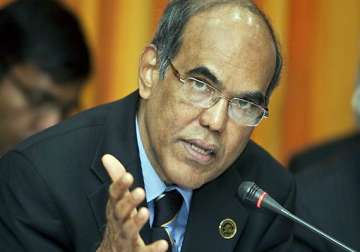Growth, Inflation Data Unreliable, Says RBI
Mumbai, Jul 5: The Reserve Bank today expressed concern over the sharply varying macroeconomic data, including those on growth and inflation, which it said on some instances led to off-the-mark estimates on the economy. “In

Mumbai, Jul 5: The Reserve Bank today expressed concern over the sharply varying macroeconomic data, including those on growth and inflation, which it said on some instances led to off-the-mark estimates on the economy. “In the Reserve Bank, we are handicapped by the reliability of some of the basic data that we need to use in policy calculations.
“In particular, the data we get on unemployment and wages do not inspire confidence as regards quality…making us second-guess how the provisional numbers may be revised upwards,” Governor Duvvuri Subbarao said today.
“Sharp volatility in IIP data is a problem. We need to understand what is leading to data volatility as it may lead to policy miscalculations,” the Governor told the 5th RBI Statistics Day celebrations at the RBI headquarters here.
“Each time when we have to make an assessment of inflation situation, we are left to double-guess how the provisional numbers may be revised upwards,” he said.
“When we were making the policy, the IIP numbers available to us in February 2010 was 6.8 percent, whereas the economy was actually growing much faster. The provisional numbers, which are off the mark by significant margin, can mislead policy calculation,” he warned.
The Governor admitted that such revisions are also factors behind the RBI making inflation projections that proved to be below the actual number in the last fiscal year.
RBI had initially forecast an annual inflation at 5.5 per cent by March'11, but subsequently was forced to revise it upwards to a high 7 per cent and then to 8 percent. And finally when the year ended, it was at a much elevated level of 8.98 percent, which was ironically revised further upwards to 9.68 percent in June.
Similarly, the March IIP numbers were also revised upwards to 7.8 per cent in June from the initial reading of 7.3 per cent released in May, while a sharper revision was seen for the December IIP, which was upwardly revised to 2.5 per cent from the provisional reading of a poor 1.6 per cent.
“Erroneous signals from the then-available IIP data suggested moderation in growth and demand,” as well as “the larger-than-usual upward revisions to the past inflation data, had the RBI's inflation projections remaining systematically below the actual outcome,” Subbarao admitted.
On the impact of the regular trend of sharp data revisions, the Governor said, the RBI's policy formulation is also handicapped by frequent revisions to data.
“We make policies in real time and if the provisional data are inaccurate, the resultant policies can turn out to be sub-optimal choices,” he said.
Citing the sharp changes in the GDP numbers, Subbarao said, “For FY10, the advance estimate of GDP growth rate at market prices from the expenditure side, that came out in February 2010, was 6.8 per cent. That was changed to 7.7 per cent in the revised estimate in May, 2010 and further to 9.1 per cent in the quick estimate in February, 2011.
“Therefore, policy that per force had to use information on advance estimate was fraught with the risk of underestimating the growth momentum,” the Governor said.
Stating that the recently released employment data throw up a paradox, he said they simultaneously indicate fewer jobs created in the five years to 2010 along with a decline in the long-term unemployment rate.
On the issue of wage statistics, he said, the upward pressure on wages in the unorganised sector is inconsistent with what are believed to be high rates of unemployment and underemployment in the informal economy. PTI